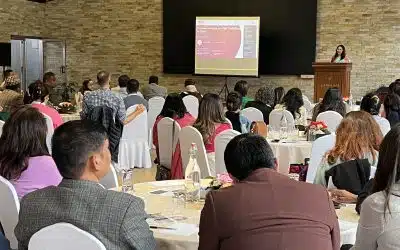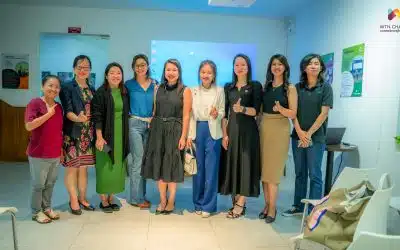InAsia
Insights and Analysis
Changing the Law to Protect Trafficking Victims in Vietnam
April 15, 2020
When Van Ngoc Ta reflects on his career as a lawyer, one particular case, from 2014, stands out in his mind: a young girl who was a victim of sexual abuse, raped by a neighbor who was later allowed to walk free.
Van had tried to take her case, but he was turned down repeatedly by police—effectively barred from representing the victim in court. Why? Because of an ambiguity in the law. Vietnam’s Criminal Procedure Code guaranteed defendants the right to legal counsel, but did not explicitly afford that right to victims. Unable to obtain justice for his daughter, her father ultimately committed suicide in protest and frustration. It is now 2020, and the girl’s rapist is still at large.
Without legal representation, a victim like the girl in this case, already traumatized and with no knowledge of the law, often could find no clear path to justice.
Situations like this one were possible because of shortcomings in Vietnamese law, which for years failed to clearly codify important legal protections for victims of crime. Without legal representation, a victim of human trafficking or sexual assault like the girl in this case, already traumatized and with no knowledge of the law, often could find no clear path to justice.
But all of that has now changed as a result of the efforts of young reformers like Van, who helped identify the legal flaw and successfully challenged the law.

Vietnamese lawyer and anti-trafficking activist Van Ngoc Ta (Photo: Amanda Bensel / The Asia Foundation)
Van is a lawyer and activist and an operative for the Blue Dragon Children’s Foundation. In person, he is disarmingly humble and unassuming. We met on a hotel rooftop in Hanoi during a work break, where he invited me, in a quiet voice, to sit down, relax, and celebrate with him. “I deserve this,” he said, as he unwrapped and trimmed a cigar. “My job brings me a lot of stress.”
Beneath Van’s reserved demeanor is a person who frequently journeys into the dark world of human trafficking, braving great danger to find captive children and young adults and bring them to safety under the care of his NGO.
On top of being a field operative, he’s an experienced attorney. When able, he provides counsel to trafficking victims who have ended up in the hands of the authorities. That experience, Van says, caused him mounting frustration as he tried to ensure the most basic legal protections for the vulnerable. The 2014 case weighed on him heavily: he saw that the law was flawed, and he wanted to do something about it.
Van joined The Asia Foundation Development Fellows program looking for resources to help him in his quest.
It was during this period of reflection, in 2018, that he joined the Asia Foundation Development Fellows program, looking for resources to help him in his quest. “During my interview with The Asia Foundation, I told them that I wanted to increase my capacity and expand my professional network so that I could accomplish this important legal reform project.”
Van says the Development Fellows program helped him build the confidence he needed to push ahead. “During my time with the other fellows, we discussed my situation and how I could reach my goals,” he says. “Some fellows contributed ideas and suggestions and even helped me draft a proposal.”

Van Ngoc Ta and members of the 2018 Asia Foundation Development Fellows (Photo: Amanda Bensel / The Asia Foundation)
His experience is emblematic of a wave of younger, civic-minded leaders who are tackling Vietnam’s pressing social challenges. As citizens, and therefore direct stakeholders, they are well situated to identify problems that can often be quite complex, and then to pivot toward thinking politically to push for change.
It was not long after Van’s first encounter with his Development Fellows cohort that things began moving forward. “We initiated a process of dialogue, research, and legal review with the Vietnamese government,” explains a Blue Dragon press release. “Bringing together officials, lawyers, and police from around the country for formal discussions in Hanoi and Ho Chi Minh City, we gathered feedback and advice and worked with the Ministry of Public Security to develop what is now known as Circular 46.”
Circular 46, codifying a victim’s right to an attorney, officially went into effect in December 2019, and the flaw in the criminal code was finally mended. To date, Van has provided legal representation in 83 court cases, helping nearly 100 victims of human trafficking and sexual abuse.
“Ultimately, Vietnam’s Criminal Procedure Code will need to be revised,” says Van, “but for now, Circular 46 addresses this one shortcoming and highlights the needs and rights of crime victims for all in the justice system to see.”
Davey Kim is a former senior program officer for The Asia Foundation’s Leadership and Exchange Programs unit, and is now program manager at Stanford University’s Center on Philanthropy and Civil Society. He can be reached at [email protected]. The views and opinions expressed here are those of the author, not those of The Asia Foundation.
About our blog, InAsia
InAsia is posted and distributed every other Wednesday evening, Pacific Time. If you have any questions, please send an email to [email protected].
Contact
For questions about InAsia, or for our cross-post and re-use policy, please send an email to [email protected].The Asia Foundation
465 California St., 9th Floor
San Francisco, CA 94104
The Latest Across Asia
News
April 2, 2024
Program Snapshot
March 28, 2024
Program Snapshot
March 28, 2024
Program Snapshot
March 25, 2024

2024 Lotus Leadership Awards
Thursday, April 25, 2024, New York City
The Lotus Leadership Awards recognize contributions towards gender equality in Asia and the Pacific







0 Comments